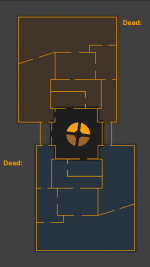The exactly one map I have for now is divided into zones. Adjacent zones are marked with uhm gaps in the "walls"; orange symbol in the center is the objective. Your team has to control that zone (have only your units within it) for two consecutive rounds to win.

There's three types of movement:
- Move: move to any adjacent zone
- Advance: move to an adjacent zone that has enemy units
- Retreat: move to an adjacent zone that does not have enemy units
If at the end of your turn you are in the zone your team controls, you Guard it. The first enemy to move into it gets shot.
There are four very simple classes that have very specific patterns of action that must be executed in the specified order (so if it's Advance-Attack-Move, you can't attack first and then advance). If you can't make any legal move, you immediately die. Nasty stuff.
- Scout has 2HP and can
- Advance - Attack - Move
- Retreat - Retreat
- Heavy has 3HP and can
- Move
- Attack
- Do nothing (it's a very important ability!)
- Sniper has 1HP and can
- Retreat
- Mark an adjacent zone to Guard infinite amount of times (as opposed to everyone else just shooting the first enemy to walk into it and that's it); sniper also can't Guard his own zone
- Medic has 2HP and can
- Move
- Any allied unit can immediately end his turn if he is in the same zone as Medic
- Any allied unit that ends his turn is the same Medic gains +1HP, up to its maximum +1 (so, Scout can be overhealed to 3, heavy can 4 and so forth)

